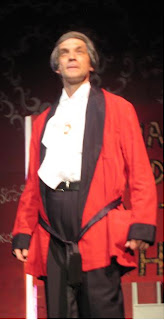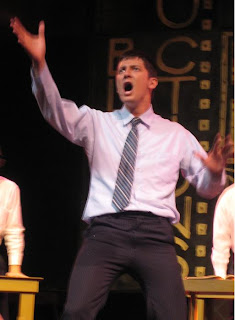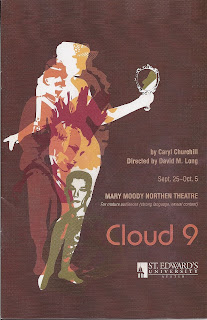
This zany musical comedy comes bursting out of the Georgetown Palace stage like fireworks on the 4th of July.
Yes, we all know the story. After all, the Mel Brooks film about fraudsters producing a Broadway musical was released in 1968, forty years ago.
Brooks and co-writer Thomas Meehan turned it into a real Broadway musical in 2001, with musical numbers by Brooks, where it won an unprecedented 12 Tony awards and ran for 2500 performances. The London production ran for three years.
And in 2005 Sony Pictures made a movie of it – a movie about a musical about producing a musical, drawn from a movie about producing a musical.
But who cares? The Georgetown Palace production is terrific fun and its big- voiced glittering cast of 24 could have filled with music and laughter a hall ten times as large as the 300-seat Palace.
It’s gaudy, vulgar, suggestive, happy and filled with as many comics and Girls Girls Girls as any Ziegfield show.
Yes, you’ll recognize almost every bit from the movie(s) or the Broadway show – the fretful, mendacious Max Bialystock, his reluctant partner the nervous young CPA Leopold Bloom, Ulla the Swedish knockout with all those names, Otto the Nazi, flaming homosexuals, and the little old ladies enamored of Max. Mel Brooks spares no one, and that’s part of the fun of it.
When Jewish comedian Mel Brooks came up with the concept for The Producers and the musical number “Springtime for Hitler” back in 1968 it was a dazzling piece of audacity. For gosh sake, World War II had ended less than twenty-five years before that, and the “Greatest Generation,” contemporaries with Brooks, were in the spring of middle age.
Brooks was God’s fool, dancing on the rawest catastrophe of the western world and daring to laugh at the guilty, long and hard, while mocking the business of show business.
The Palace scrupulously advises its patrons, Rated PG-13 for sexual humor and references and is intended for mature audiences.
The shock value is mostly gone today, although I wonder what conversations parents had after opening night with the various ten- to twelve-year-olds dressed in their best and seated in the front rows. In fact, those youngsters were probably unshockable - - but maybe apprehensive about discussing sex jokes and flowering queens with their parents.
Stars Matt Gauck as Max Bialystock and Larry Frier as the worried young Leo Bloom are a great pair of song-and-dance comedians.

Gauck must have been stifling under the stage lights with that padded belly and an elaborate bald wig with comb-over; the ageing effect of his makeup was a bit too sharp in the opening scenes but the fast pace and relentless clowning got it properly blended in.
Bialystock is the epitome of an unscrupulous egotist, and the ongoing gag of his instruction of the naïve Bloom on Broadway ethics and morals was comic and cautionary.
A quick summary, in case you’ve been hiding under a rock for the last 40 years: Bialystock is on his way down, reduced to seducing a stable of little old ladies for funds. Visiting him, the grandma type nicknamed “Hold Me,Touch Me” suggests coyly, ”Let’s play the virgin milkmaid and the well hung stable boy!”

Bloom, the quiet, worried accountant, comments to Bialystock in passing that if backers lost money in a show, it would be easy to conceal contributions and keep excess financing. Bialystock leaps on the idea and pushes Bloom to become his partner in crime.
Bloom declines, but back at the Dickensean accounting office, he succumbs to visions of glamor, success and showgirls.

So B&B set out to find the worst possible script, the worst possible director, and the worst possible actors. And they succeed!
The script is “Springtime for Hitler” by unrepentent Nazi Franz Liebkind (Bill Lindstrom, also a fine hoofer, with accent, helmet and mad-eyed devotion). [German: "Liebkind" = English "Love Child."]

The director is Roger DeBris (Matt Connely), as wildly, extravagantly queer as one could imagine, shown here being coiffed by his sidekick Carmen Ghia (played with wicked, pouting, hip-swiveling delight by Palace regular Matthew Burnett). ["Bris" is the Jewish ritual of circumcision, carried out on a Jewish male child the 8th day after birth; the "Carmen Ghia" was a nifty sport car from the 1950s.]

And for the actors, Nazi Liebkind and the luscious Swedish cupcake Ulla Inga Hansen Bensen Yonsen Tallen-Hallen Svaden-Svanson. Bialystock explains to Bloom, “There’s always a part for the producer’s girlfriend!”
 Nicole Pritchard as Ulla can act, sing, and dance, and she’s as tasty a bit of eye-candy as you’re likely to see. Pritchard has just gotten to Austin after playing Disney characters at Orlando for three years. Texans are clear winners by the change.
Nicole Pritchard as Ulla can act, sing, and dance, and she’s as tasty a bit of eye-candy as you’re likely to see. Pritchard has just gotten to Austin after playing Disney characters at Orlando for three years. Texans are clear winners by the change. The show goes on, complete with that signature number, “Springtime for Hitler.”

Ulla plays a sort of Miss Rhinegold walk-on (a concept straight out of Ziegfield).

The show is a disaster. But only for Bialystock and Bloom. At the last minute they must substitute director DeBris for Nazi Liebkind in the role of Hitler, and a campy, crowd-loving Adolf makes the show a smash hit.
Max Bialystock gets arrested while Bloom and Ulla abscond to Brazil. Max waxes indignant in jail, recounting in fragmentary fashion the whole plot to that point, getting one of the biggest laughs in the show.
Bloom returns. Both go to prison, where they put on a wildly successful prison revue and get pardons. They celebrate with a fine bit of hoofing at the end.

Before the show, director Mary Ellen Butler greeted the opening night audience and invited them to the on-stage post-production party. She warned us that because technical director Ron Watson had just sprained an ankle, his substitute working the twelve sets of flies (hoistable scenery) might be shaky from time to time. And by the way, Austin’s Paramount theatre is equipped with only ten sets of flies.
So what’s not to like, already? This show has energy, glitter, comedy and class; it’s an insouciant salute to the big kid in all of us. It makes us say, like Leopold Bloom, I wanna be a producer, too.
Congratulations to cast, director, and crew. This was a huge, complicated piece to produce. Mary Ellen says that 2000 hours of volunteer labor went into construction of the sets. Ensemble members had up to 9 costume changes and pitched in to keep those scene changes running smoothly. They all appeared to be having the time of their lives. They certainly deserved that enthusiastic applause at the curtain call.

And congratulations once again to the Georgetown Palace Theatre for its vaulting ambition and the high quality of its entertainment!
Warren & Derrick's on-line favorable comments about this production, October 20
Ronnisrants comments, October 25
New York Times rave review of the Broadway production, April 20, 2001 - - “A Scam That’ll Knock ‘em Dead”
Wikipedia on The Producers (Musical)
The 1968 movie at Internet Movie Database (IMDB.com), with a 42-image slide show
IMDB memorable quotes (lots of them!) from The Producers, 2005 movie version






















 Her oldest, Emmie (Shavana Calder), is a young teen indifferent to the assassination of Kennedy (“some white guy”), entranced by pop music, and involved in the prank of “kidnapping” the statue from the monument to Confederate war heroes. Calder is confident, talented and a pleasure to watch. She, Stinson and Sarah Yvonne Jones as Caroline’s friend Dotty are the only adult characters of believable depth in the piece.
Her oldest, Emmie (Shavana Calder), is a young teen indifferent to the assassination of Kennedy (“some white guy”), entranced by pop music, and involved in the prank of “kidnapping” the statue from the monument to Confederate war heroes. Calder is confident, talented and a pleasure to watch. She, Stinson and Sarah Yvonne Jones as Caroline’s friend Dotty are the only adult characters of believable depth in the piece. 




















